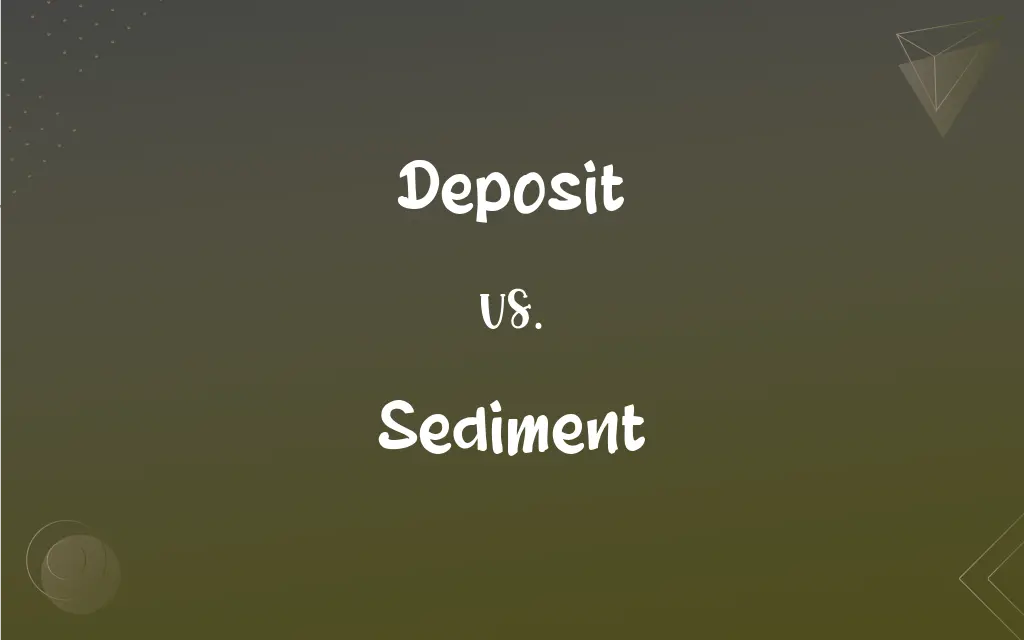Deposit vs. Sediment: What's the Difference?
Edited by Janet White || By Harlon Moss || Updated on November 13, 2023
A deposit is a layer or body of accumulated matter, while sediment is specifically the matter that settles to the bottom of a liquid.

Key Differences
"Deposit" and "sediment" both involve materials left in a place but differ in context and usage. Deposits can refer to any accumulation of substances, such as minerals left by water, whereas sediment specifically refers to particles that settle at the bottom of a liquid. Deposits are often associated with the process of deposition, which can occur through various mechanisms like precipitation or evaporation, while sediment is the result of sedimentation, typically in water bodies.
Geologically, a deposit can encompass a wide range of materials, including sediments, but also includes the accumulation of mineral ores or other geological matter in a location. Sediment, on the other hand, is part of this broader category, usually implying finer particles that have been transported and deposited by fluid movements, such as river silt, oceanic detritus, or other particulate matter.
Deposits can also have a financial connotation, referring to money placed into a bank account, completely unrelated to the geological term. Sediment never has this financial meaning and is strictly used in physical and environmental contexts. Thus, while all sediments can be considered deposits in a geological sense, not all deposits are sediments.
In terms of formation, deposits can be created by various geological processes, including the action of ice, wind, water, or gravity. Sediment is typically associated with water, where it often forms sedimentary layers over time that can turn into sedimentary rock under the right conditions. While deposits can be valuable resources (like gold deposits), sediment is often a concern for water quality and ecosystem health.
Deposits cover a broader scope and can include large-scale formations like sand dunes or mineral veins. Sediment usually describes finer materials like clay, sand, or organic material that can form sedimentary rocks or create layers on the bottoms of lakes, rivers, and oceans. The two terms intersect but are not interchangeable; deposits are a broader term, and sediment is a type of deposit.
ADVERTISEMENT
Comparison Chart
Definition
Accumulation of material in a natural or artificial layer
Particulate matter that settles from suspension in a liquid
Context
Geological, banking, and various other contexts
Primarily geological and environmental
Types of Materials
Minerals, money, ores, gravel, etc.
Silt, clay, organic matter, sand, etc.
Formation Processes
Deposition from water, wind, ice, or gravity
Sedimentation, usually in water
Relation to Liquid
Not necessarily related to liquids
Always related to liquid environments
ADVERTISEMENT
Deposit and Sediment Definitions
Deposit
A layer formed by a natural process.
Glacial deposits shaped the landscape.
Sediment
Fine-grained material in natural waters.
The lake's clear water had little sediment.
Deposit
An accumulation of natural resources.
The area is known for its rich gold deposits.
Sediment
Material that settles at the bottom of a liquid.
Sediment collected at the bottom of the wine bottle.
Deposit
A sum of money placed in a bank.
He made a deposit into his savings account.
Sediment
Residue that is not soluble in water.
The sediment in the tank needs to be cleaned out regularly.
Deposit
To place for safekeeping or as a pledge.
She deposited the documents in the safe.
Sediment
Particles from eroded rocks.
The river carries sediment downstream.
Deposit
Material left by a natural phenomenon.
Volcanic deposits can be found across the region.
Sediment
Accumulated organic matter.
The pond sediment was rich in decomposed leaves.
Deposit
To put or set down; place.
Sediment
Material that settles to the bottom of a liquid; lees.
Deposit
To lay down or leave behind by a natural process
Layers of sediment that were deposited on the ocean floor.
Glaciers that deposited their debris as they melted.
Sediment
Solid fragments of inorganic or organic material that come from the weathering of rock and are carried and deposited by wind, water, or ice.
Sediment
A collection of small particles, particularly dirt, that precipitates from a river or other body of water.
The Nile delta is composed of sediment that was washed down and deposited at the mouth of the river.
Sediment
(transitive) To deposit material as a sediment.
Sediment
(intransitive) To be deposited as a sediment.
Sediment
The matter which subsides to the bottom, from water or any other liquid; settlings; lees; dregs.
Sediment
The material of which sedimentary rocks are formed.
Sediment
Matter deposited by some natural process
Sediment
Deposit as a sediment
Sediment
Settle as sediment
FAQs
How do deposits form?
Deposits form through natural processes like erosion, weathering, and deposition.
Are all deposits made of sediment?
No, deposits can include other materials like minerals or organic substances.
What is a deposit?
A deposit is a layer or mass of material that has accumulated in one place.
What is sediment?
Sediment is material that settles to the bottom of a liquid.
Can sediment become a rock?
Yes, over time, sediment can compact and cement into sedimentary rock.
Can a deposit refer to money?
Yes, in banking, a deposit is money placed into an account.
Can deposits be mined?
Yes, mineral deposits are often mined for resources.
Is sediment always harmful to water?
Not always, but excessive sediment can harm aquatic life and water quality.
What is a sedimentary basin?
It's a low area where sediments accumulate over time.
What causes sediment to form?
Sediment forms from the erosion and breakdown of rocks and organic materials.
Why is sediment important?
Sediment can form sedimentary rock and is crucial for certain ecosystems.
Are sediments always small particles?
Sediments typically consist of fine particles, but can vary in size.
What is sediment transport?
It's the movement of sediment by water flow, wind, or ice.
Do deposits have economic value?
Yes, deposits like coal or oil have significant economic value.
Can sediment affect water flow?
Yes, sediment buildup can alter water flow and lead to flooding.
Can the term deposit be used in construction?
Yes, construction materials like gravel can be referred to as deposits.
Are deposits renewable?
Some, like soil deposits, can be renewable, but mineral deposits are not.
Do all water bodies have sediment?
Most do, as sediment is a natural part of water ecosystems.
Is it possible to remove sediment?
Yes, through processes like dredging or filtration.
How are sediment layers studied?
Sediment layers are studied to understand historical environmental conditions.
About Author
Written by
Harlon MossHarlon is a seasoned quality moderator and accomplished content writer for Difference Wiki. An alumnus of the prestigious University of California, he earned his degree in Computer Science. Leveraging his academic background, Harlon brings a meticulous and informed perspective to his work, ensuring content accuracy and excellence.
Edited by
Janet WhiteJanet White has been an esteemed writer and blogger for Difference Wiki. Holding a Master's degree in Science and Medical Journalism from the prestigious Boston University, she has consistently demonstrated her expertise and passion for her field. When she's not immersed in her work, Janet relishes her time exercising, delving into a good book, and cherishing moments with friends and family.































































